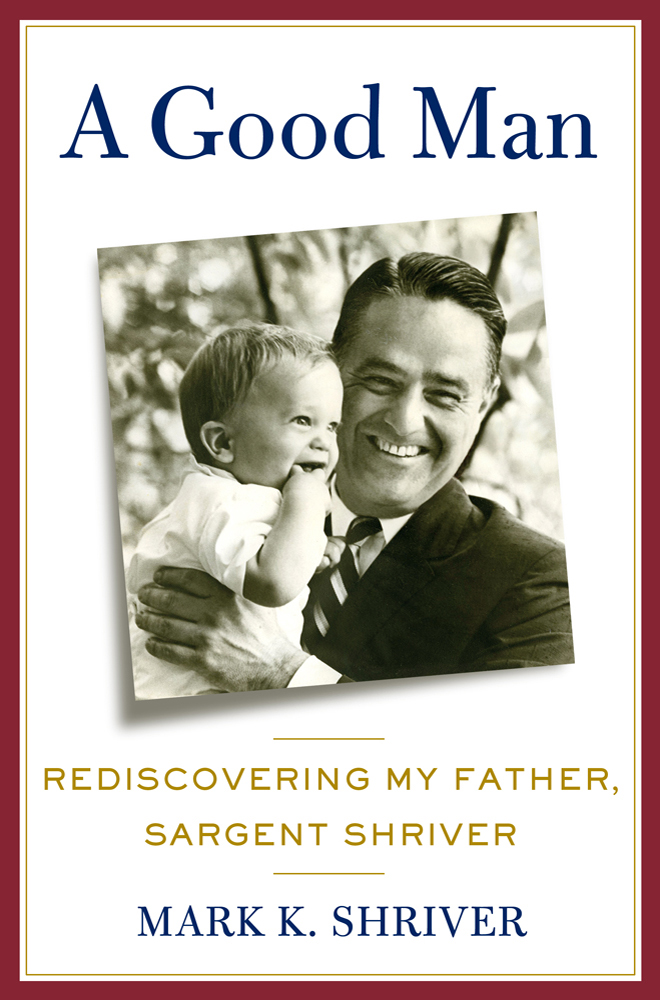"A Good Man, Rediscovering My Father, Sargent Shriver" by Mark K. Shriver
 Monday, September 24, 2012 at 02:23PM
Monday, September 24, 2012 at 02:23PM Book Recommendations
 Monday, September 24, 2012 at 02:23PM
Monday, September 24, 2012 at 02:23PM

In this intimate portrait of an extraordinary father-son relationship, Mark K. Shriver discovers the moral principles that guided his legendary father and applies them to his own life
When Sargent "Sarge" Shriver, founder of the Peace Corps and architect of President Johnson's War on Poverty, died in 2011 after a valiant fight with Alzheimer's, thousands of tributes poured in from friends and strangers worldwide. These tributes, which extolled the daily kindness and humanity of "a good man," moved his son Mark far more than those who lauded Sarge for his big-stage, headline-making accomplishments. After a lifetime searching for the path to his father's success in the public arena, Mark instead turns to a search for the secret of his father's joy, his devotion to others, and his sense of purpose. Mark discovers notes and letters from Sarge; hears personal stories from friends and family that zero in on the three guiding principles of Sarge's life—faith, hope, and love—and recounts moments with Sarge that now take on new value and poignancy. In the process, Mark discovers much about himself, as a father, as a husband, and as a social justice advocate. A Good Man is an inspirational and deeply personal story about a son discovering the true meaning of his father's legacy.
 Monday, September 24, 2012 at 02:14PM
Monday, September 24, 2012 at 02:14PM ABSTRACT: LETTER FROM MUMBAI about a thirteen-year-old scavenger named Sunil who lives in a slum near the city's international airport. Gautam Nagar is one of thirty-odd slums comprising ninety-thousand families, on land owned by the Airports Authority of India, in Mumbai. It is ringed by five of the city's smartest hotels. Tells about Anna, an elderly Tamil, who owns a game parlor in Gautam Nagar and serves as a dealer of scrap metal and other materials collected by inhabitants of the slum. On January 22, as a parade of local women visited the hotel spas to get manicured, exfoliated, and blown out for that night's Indian première of "Slumdog Millionaire," a thirteen-year-old slum resident named Sunil was playing Metal Slug 3 in Anna's parlor. Reverberations of the crisis in the American economy had recently driven Sunil from work he liked to do-collecting garbage and selling it to recyclers-into work he didn't like. He was a metal thief at the airport. Gautam Nagar has approximately a thousand residents. The primary industry is the gathering of airport garbage for recycling, of which India's surging economy has produced a lot. But last fall, when bank lending stopped worldwide, construction projects stalled and the demand for recycled materials plummeted. A kilo of empty water bottles once worth twenty-five rupees was now worth ten. Sunil had entered the garbage business when he was seven or so, after his mother died of tuberculosis. Once a lawful scavenger, he had become one of the new economy's micro-saboteurs. Writer describes Sunil creeping through an unfinished multistory car park at night to steal "German silver," a term used in the slum to mean aluminum, electroplate, nickel, and an alloy used in cutlery. Tells about the increase in security at the airport following the terrorist attacks on Mumbai last November. Sunil lied about school all the time. At the start of the school year, last July, Sunil had registered for classes at the local government school, as did almost every boy and girl in the slum. That first week, Sunil and the other children had staggered home with central-government incentives: bookbags, umbrellas, pencil cases. Many then went back to work, after selling the books and the school supplies to Anna. Mentions other inhabitants of the slum, including a scholarly boy named Prakash, and Zubbu, the daughter of the man who runs the local brothel. Briefly tells about Indian reaction to "Slumdog Millionaire." Many educated, successful Indians saw it not as a slight against the poor but as a denial of the increasing affluence and prominence of their country. Tells about crime in Mumbai and considers the idea that authorities tolerate small-scale theft as a way of keeping relative peace in one of the world's great unjust cities.